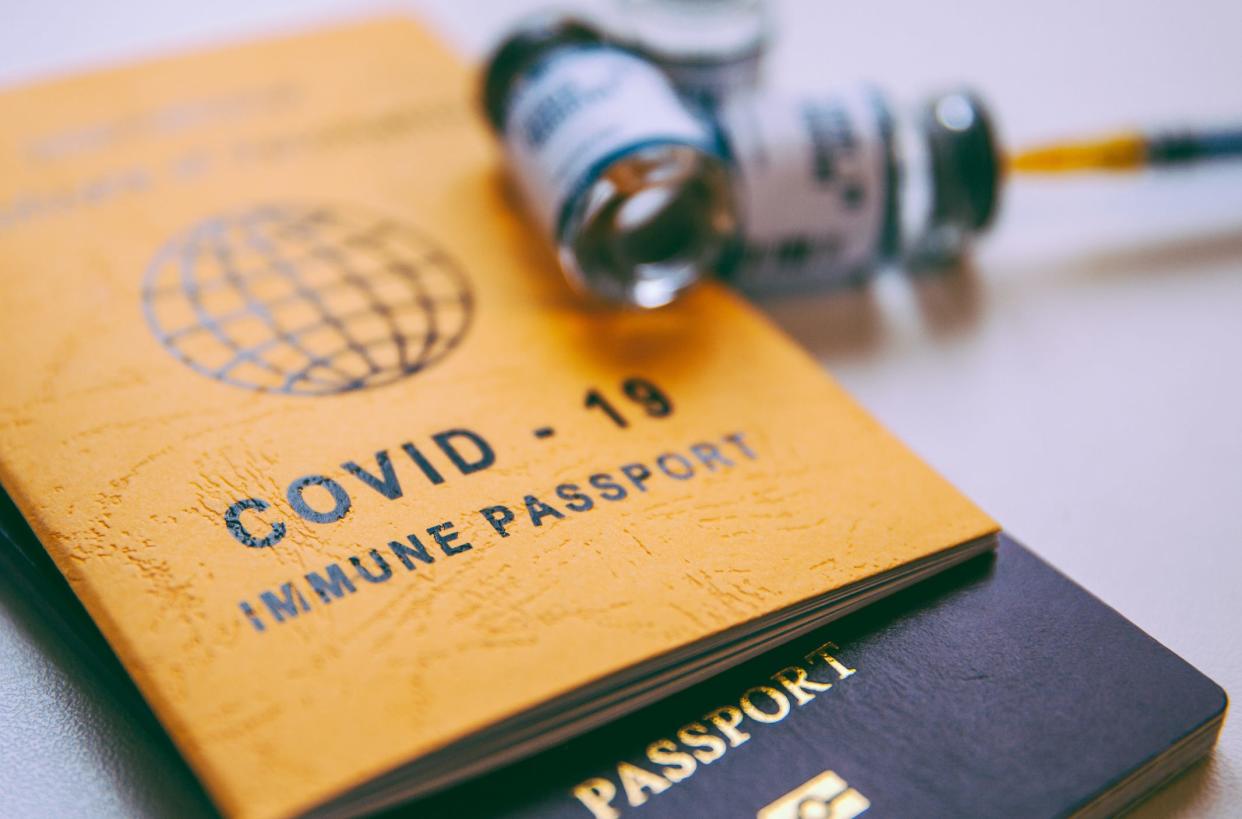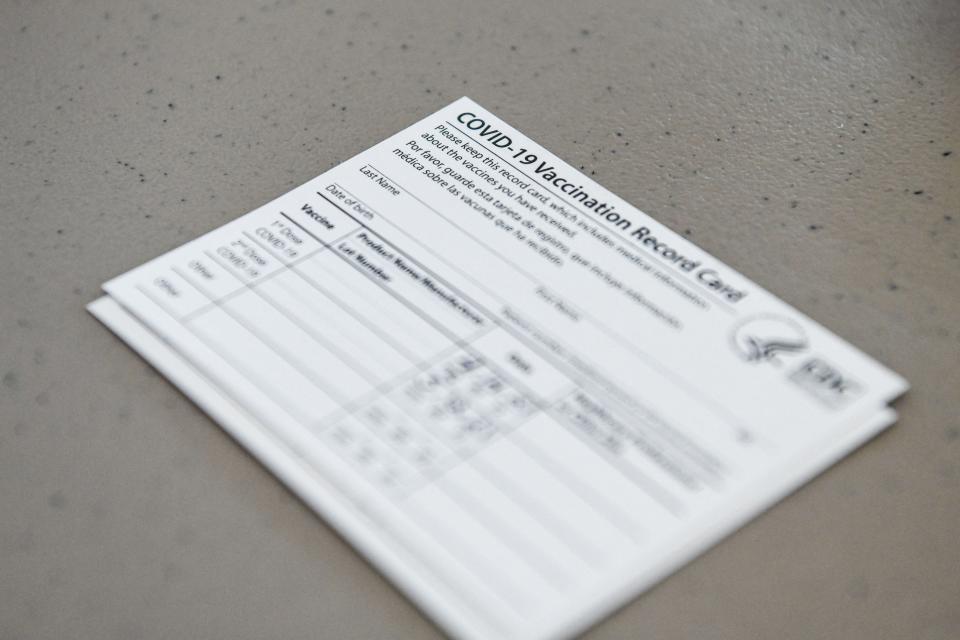Do I need a vaccine passport to travel? The answer is no – for now, anyway

Don't forget to pack your vaccination passport this summer.
At least that's what Chau Mui thought when she heard about a new vaccination certification program in New York, where she lives. So Mui, who works for a marketing agency in Manhattan, quickly uploaded New York's Excelsior Pass, commonly known as a vaccination passport.
Then she waited for someone to ask her for it – in the city, at the airport, anywhere.
"Of all the restaurants, shops and venues I've been to, not one has asked for my Excelsior Pass," she says.
It kind of makes you wonder why you would need a vaccination passport to travel. As COVID-19 starts to retreat, several states and countries have introduced vaccination verification programs. New York and California have them. So do the European Union and Israel.
But do you need a vaccination passport to go somewhere? For now, the answer is almost always the same, whether you're traveling domestically or internationally: No, you don't. But you may need one to get into your favorite restaurant.
"Vaccination passports are a hot topic as governments begin to discuss how to open global economies safely," says Carrie Dolan, director of the public health-focused Ignite multidisciplinary research lab in William & Mary’s Global Research Institute. "Currently, there is no widespread adoption of a COVID-19 vaccination passport on a cross-national basis."
Put differently, there's no standard verifying a vaccination. Instead, there are various vaccination passports – New York's Excelsior Pass, California's Digital COVID-19 Vaccine Record, or Maryland MyIR.
By the way, authorities have gone out of their way not to call them vaccination passports, but for better or worse, the name has stuck. And even though it's a political hot-button – several states, including Florida and Texas, have banned vaccination passports – the name is appropriate. Why else would you care about verifying your vaccination status?
'Vaccine passports' are coming: Honor system, paper cards won't cut it for COVID-19 vaccine verification, experts say
Do I need a vaccination passport to travel domestically?
After receiving his second shot, John Hautala logged in to Maryland's MyIR site and downloaded a certificate that verified his vaccination. He kept the printed sheet with his passport. Hautala, a retired marine engineer from Pasadena, Maryland, thought he would have to show the vaccination passport wherever he went to verify his immunization. But so far, it's proven marginally useful.
"I've used it to go to a ball game and a couple of restaurants," he says. Other than that, no one has asked about his vaccination status.
Vaccination certifications are confusing. One of the most common questions I get as a consumer advocate is: Do I need my vaccine card to travel domestically?
Answer: No – at least not yet.
Part of the reason people are confused is that there's still a mask requirement for air travel and a testing requirement for air travelers arriving in the U.S. from abroad.
If the Delta variant spreads and there's another surge in cases, anything could happen. But we're not there yet. For now, according to the Centers for Disease Control and Prevention, you can travel anywhere within the United States if you're fully vaccinated. With some exceptions, you probably won't even have to show a vaccine passport during your travels.
Generally, restaurants that try to verify your vaccination status will ask that you sit outdoors if you can't show that you've been vaccinated. Outdoor events might also limit those who can't prove their vaccination status. But they're few and far between.
Do I need a vaccination passport to travel internationally?
But surely, you'll need a vaccination passport to travel abroad this summer? There, again, the answer is no. Let's say you want to visit Europe this summer. The EU has an EU Digital COVID Certificate that verifies the vaccination status of its citizens. But it's meant to verify European citizens' vaccination status, not those of tourists.
But in multiple conversations I've had with travelers and European officials, it's clear that won't be necessary for the time being. One European official told me the reason was practical concerns. After a year without tourism, they want to make it as easy as possible for Americans to visit this summer. Requiring them to apply for a vaccination passport would be too much of a deterrent.
Not only that, but the World Health Organization has recommended that national authorities refrain from requiring a vaccination passport for international travel as a condition for departure or entry.
"Further hesitancy from health organizations stems from the lack of evidence regarding how long immunity against COVID-19 will remain following vaccination or natural infection," notes Lise Barnard, a health intelligence analyst at Crisis24, a risk management company.
Have vaccine, will travel: Which countries are open to vaccinated Americans?
This is the vaccination verification card you might need
People still care about your vaccination status. But if you've had your shots, you already have all the proof you need.
"Most countries will accept the CDC's COVID Vaccination Record certification to allow you into the country," says Darko Ivanoski, founder and CEO of ESTAForm, an online travel authorization platform. That's the little white card you receive when you get your vaccination.
Tourism authorities say it's the closest thing the United States has to a vaccination passport, at least for now. The Biden administration has already said the federal government will stay out of issuing a formal vaccination passport.

If you want to play it safe this summer, consider getting an International Certificate of Vaccination or Prophylaxis, also known as the Yellow Card. It's a vaccination certification created by the WHO and recognized by most countries. Most clinics that administer vaccinations for travel, such as Hepatitis B, can issue a yellow card.
So this summer, there's one less thing for you to worry about packing. If you're traveling domestically, you probably won't need any type of vaccine verification. If you're flying abroad, your verification requirements are minimal and easy to meet. Keep that CDC Vaccination Record with you, and you'll have everything you need.
Vaccine passport tips for summer travel
Vaccine certification requirements are subject to change without notice. Here's how to stay ahead of them:
Choose a safer destination. The best way to deal with a vaccine passport problem is to avoid it altogether. If you haven't picked a place to vacation yet, go somewhere with low COVID-19 infections and minimal entry requirements. The Mayo Clinic's coronavirus map tracks infection rates in the U.S. and predicts cases over the next 14 days.
If a vaccination passport is available, get one. If you live in California, Louisiana, Maryland, or New York, that's you. Oregon, Colorado and Illinois are considering them, according to The MIT Technology Review. The verifications are easy to get, and it's better to have one than not.
Work with a travel adviser. A competent travel agent will monitor the situation and make sure you meet all the paperwork requirements. Find an agent at the American Society of Travel Advisors site.
Still traveling despite the CDC warning? Here's how to pick a safe vacation destination
Christopher Elliott is the founder of Elliott Advocacy, a 501(c)(3) nonprofit organization that empowers consumers to solve their problems and helps those who can't The views and opinions expressed in this column are the author’s and do not necessarily reflect those of USA TODAY.
This article originally appeared on USA TODAY: Vaccine passports: Do you need one to travel domestically or overseas?

